The end of the Northern War
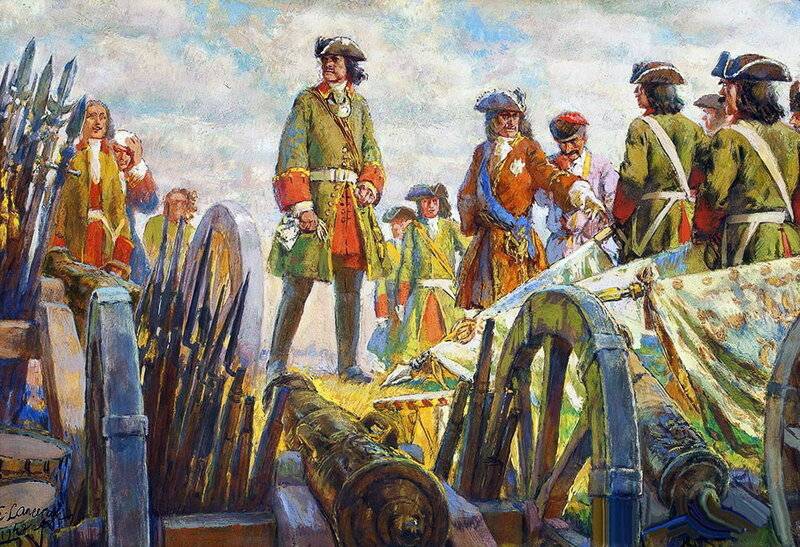
Eugene Lansere. Peter I inspects trophies of Russian troops taken during the Poltava battle from the Swedes
The defeat of the Swedish army near Poltava and the inglorious surrender of its remains at Perevolnaya made a huge impression both in Sweden and in all countries of Europe.
Root fracture during the Northern War
The English ambassador Charles Whitworth wrote then:
Danish Ambassador Georg Grund is also perplexed:
The Swedish army lost the halo of invincibility, and Charles XII no longer seemed a strategist at the level of Great Alexander.
As a result, Joseph I, the emperor of the Holy Roman Empire of the German nation, whom the Swedish king forced to give guarantees of religious freedom to the Protestants of Silesia, immediately abandoned his promises.
Karl’s protege in Poland Stanislav Leszczynski ceded his crown to the former owner - Saxon Elector Augustus the Strong. With the help of another European king (his son-in-law Louis XV), he would still try to return to Poland in 1733, but without the consent of Russia this was no longer possible. The army of Peter Lassi will defeat the Confederates, forcing the unlucky king to flee from Danzig in the clothes of a peasant. Then hetman Pototsky, who supported him, will be defeated, and Leshchinsky will again renounce the title of King of Poland and Grand Duke of Lithuania. Poland finally ceased to be a subject of international politics, turning into its object.
Even more surprising is the behavior of Charles XII, who, instead of returning to his homeland and trying to somehow correct previous mistakes, spent more than five years on the territory of the Ottoman Empire (first in Bender, then in Demirtash near Adrianople) - from August 1709 years to October 1714. And his kingdom at that time was bleeding in the struggle against the superior forces of his opponents. A certain Danes Van Effen wrote about Sweden in those years:
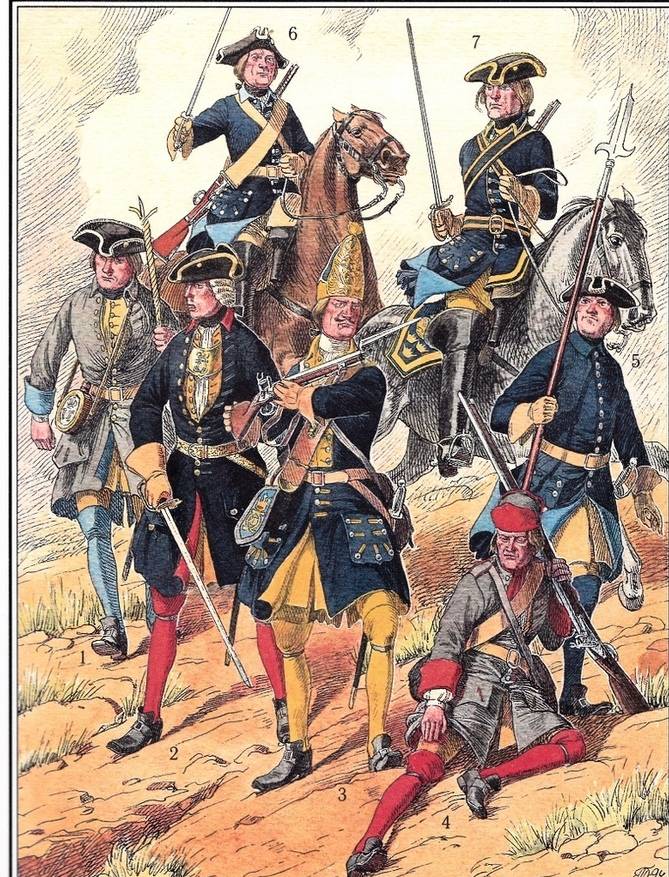
Swedish soldiers and officers of the times of the Northern War: 1 - artilleryman, 2 - officer of the Nerke-Vermland regiment, 3 - grenadier, 4 - musketeer of the Jönköping infantry regiment, 5 - non-commissioned infantry officer, 6 - ordinary dragoon regiment, 7 - life-drabant
The quality of the Swedish army was steadily declining. The experienced caroliners were replaced by poorly trained recruits, whose morale was no longer as high as that of the soldiers of the first years of this war.
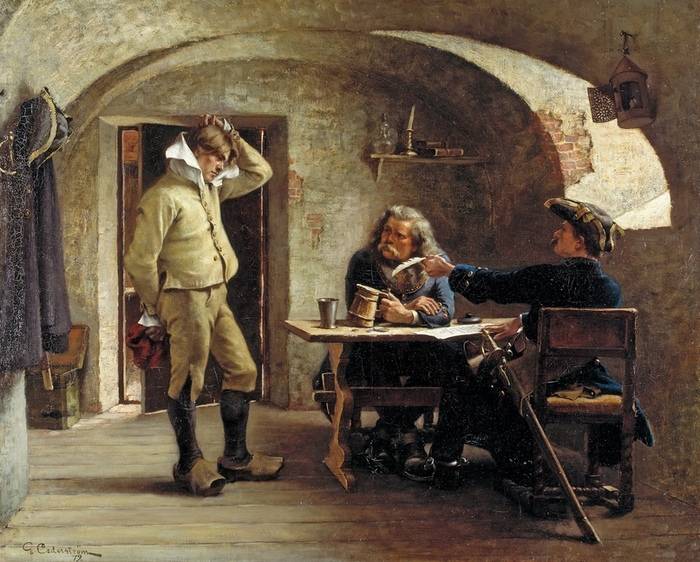
Recruit
There was nothing for the mercenary troops from the German principalities and Ostseen provinces to make them unreliable and unstable. The Swedes could still fight against the Danes, Hanoverians and Saxons, but they no longer had the slightest chance of defeating the Russian troops in a large land battle. And Karl himself, after the return of the Ottoman Empire, did not even try to take revenge from the eastern neighbor who had become formidable.
The only circumstance that allowed Sweden to delay the signing of the inevitable peace with the formal recognition of the already passed transition under the control of Russia Ingria, Estonia and Livonia was the absence of Peter the Great fleet, which could compete on equal terms with the Swedish, and carry out landing on the coast of the metropolis. But the situation has been steadily changing. New battleships came into operation: 17 were purchased in England and Holland, 20 were built in St. Petersburg, 7 in Arkhangelsk, two each in Novaya Ladoga and the Olonets shipyard. In addition to them, frigates were acquired: 7 in the Netherlands and 2 in England. The fleet also included 16 shnivs (a two-masted ship with 14-18 guns on board), as well as more than 200 galleys.
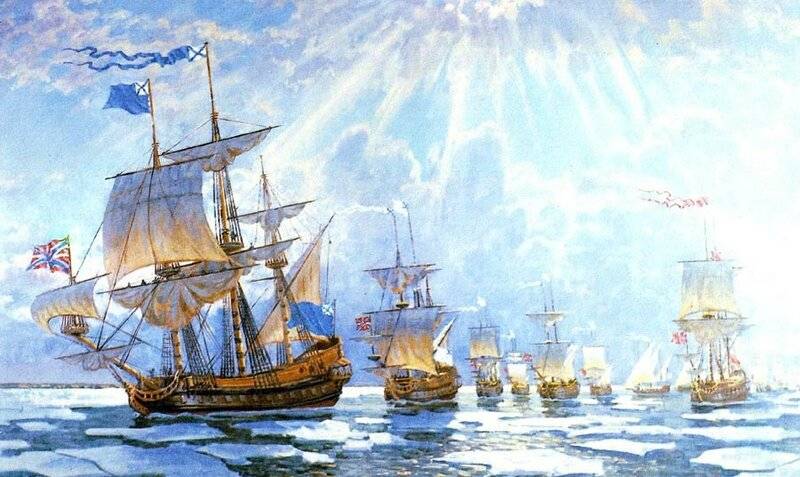
V. Yarkin. Petrovsky squadron of 1721
In June 1710, Vyborg was captured by Russian troops, in Helsinki (Helsinki) in July, and in October of that same year, two important Baltic fortresses, which had long been besieged by Russian troops - Riga and Revel, fell.
The Swedes hoped for help from the Ottoman Empire, as well as from England, France, Prussia, who were already beginning to fear the strengthening of Russia and its growing influence on European affairs. And help really came.
In November 1710, a war with Turkey, which was extremely unsuccessful for Russia, began, during which the army of Peter I was surrounded by the Prut River (July 1711). Azov and Taganrog were lost, the Azov fleet was burned (about 500 ships), the Zaporizhzhya Sich passed under the jurisdiction of the Sultan, Russia took upon itself the obligation to withdraw troops from Poland.
And the so-called powers of the Great Union (England, Holland and Austria, allies in the "war for the Spanish inheritance") on March 20, 1710 signed the Northern Neutrality Act. According to this document, the opponents of Sweden had to abandon the invasion of Swedish possessions in northern Germany, and the Swedes - not to replenish their troops in Pomerania and not to use them in a further war. Moreover, a convention was signed in The Hague on July 22 of that year, providing for the creation of a “peacekeeping force” corps by the Great Union, which would guarantee that the parties concerned comply with the terms of this act. It should have included 15,5 thousand foot soldiers and 3 thousand cavalry.
Renewal of the Northern Union
Despite its clear benefits, Charles XII rejected this offer. As a result, in August 1711, the Danish and Saxon armies (supported by the Russian units) entered Pomerania, but the Allied actions were unsuccessful, and it was not possible to take the besieged fortress Stralsund. In March 1712, the Russian corps was sent to Pomerania under the command of Menshikov (later Peter himself joined him). The Danes and Saxons acted passively, allowing the Swedish general Magnus Stenbock to capture Rostock and Mecklenburg. In December, Stenbock hit the Danish-Saxon army, which, contrary to the advice of Peter I, entered the battle, without waiting for the Russian units to approach, and was defeated by Gadebusch. The Danes lost all their artillery.
Military operations resumed in January 1713 - already in Holstein. Stenbock was defeated near Friedrichstadt, the remains of his army took refuge in the Holstein fortress Tenningen. Its siege lasted until May 4 (15), 1713: the Swedish army of 11 people, weakened by hunger and epidemics, capitulated, after which Menshikov’s troops besieged Stettin and stormed the city on September 485 (18). This city was transferred to Prussia - in exchange for the accession of this country to the Northern Union.
Battle of Gangut
And on July 27 (August 7), 1714, the Russian fleet won the Gangut Peninsula (from the Swedish Hangö udd), which currently bears the Finnish name Hanko.
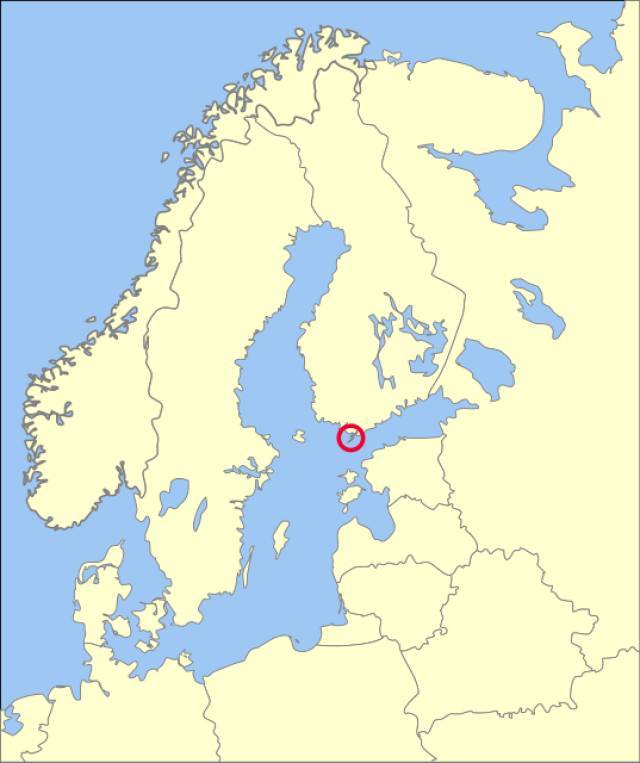
Hanko Peninsula (Gangut) on the map of Finland
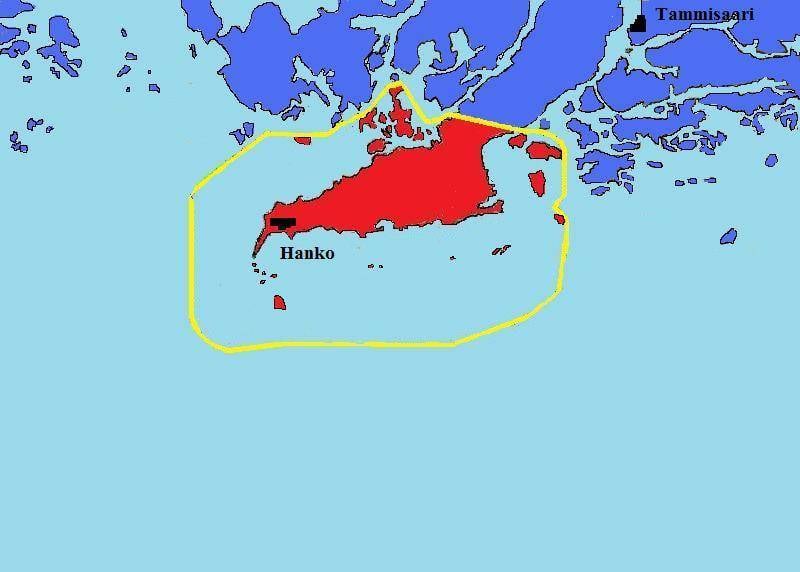
Hanko Peninsula
This battle was the largest naval battle between Sweden and Russia in the Northern War, in honor of this victory the name "Gangut" was assigned to 5 large warships.
By this time, Russian troops already controlled southern and central Finland (which was occupied mainly in order to give way to Sweden in peace talks). In the city of Abo (modern Turku), north of Gangut, a Russian garrison was stationed, to strengthen which in June 1714, 99 galleys, scampaways and other vessels were to be delivered by a hull of 15 thousand people.
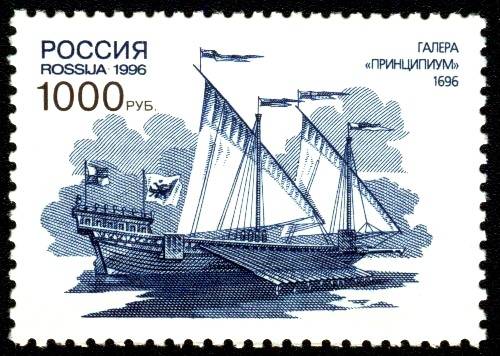
1696 Principium Galley on a postage stamp
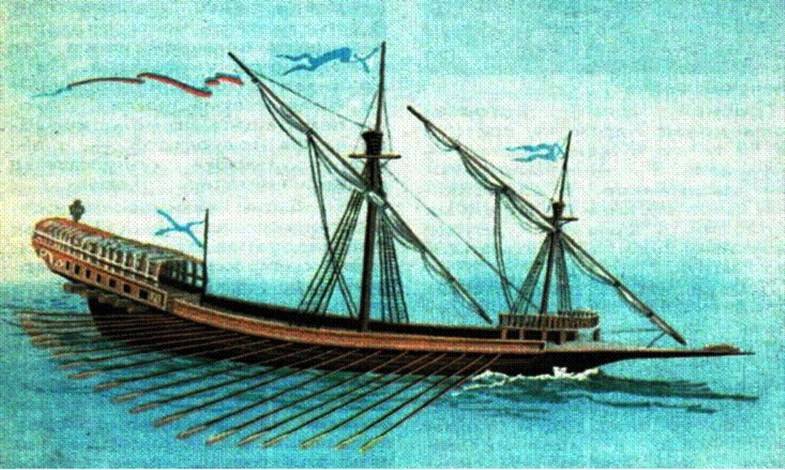
Russian scampaveia (half-galley)
The Swedish fleet, commanded by Gustav Watrang, went to sea to prevent the passage of this squadron to Abo. It consisted of 15 battleships, 3 frigates and 9 galleys. Thus, being inferior to the Russians in the number of ships, the Swedes significantly exceeded their fleet in firepower, and believed that they would be able to easily defeat light and lightly armed rowing vessels. The detachment of Vice Admiral Lilie, consisting of eight battleships and two bomber ships, blocked the Russian squadron in Tverminna Bay. Wattrang with the rest of the ships is located nearby.
Peter I, who was at the squadron rank of chautbenhacht (this rank corresponded to Major General or Rear Admiral) and the squadron commander, Admiral F.M. Apraksin, did not want to give a big battle using the fleet of "real" large sailing ships (in Revel at that time there were 16 battleships). Instead, a decision worthy of an ancient Greek or Roman strategist was made: the soldiers landed on the shore began to arrange a “re-fetch” in the narrowest point of the isthmus, where its width reached only 2,5 km. Wattrang reacted to this by sending to the northern coast of the peninsula the 18-gun Pram "Elephant" (sometimes mistakenly called a frigate), accompanied by six galleys and three skherboats - all of these ships carried 116 guns on their sides. Rear Admiral N. Erenschold was appointed commander of this detachment.
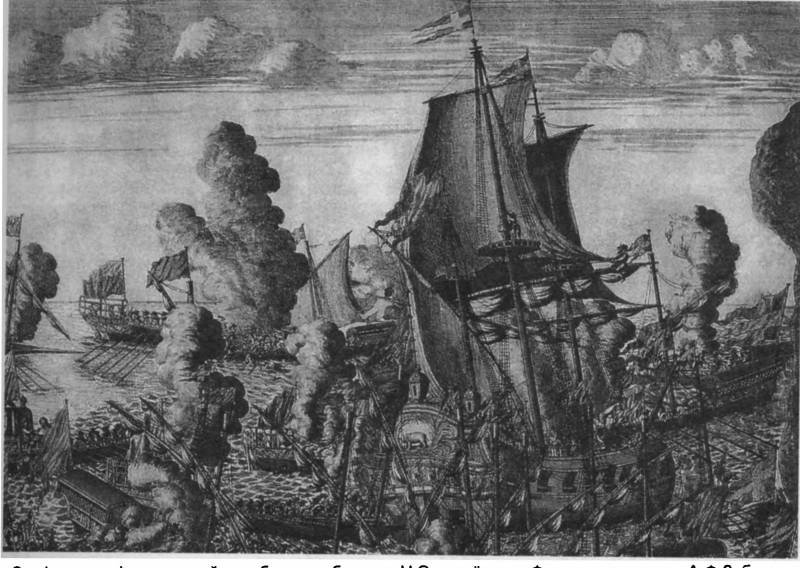 "Elephant", the flagship of Erenselt, a fragment of an engraving by A.F. Zubov. It is sometimes called a frigate, but the "Elephant" is a flat-bottomed vessel, and therefore cannot be called a frigate
"Elephant", the flagship of Erenselt, a fragment of an engraving by A.F. Zubov. It is sometimes called a frigate, but the "Elephant" is a flat-bottomed vessel, and therefore cannot be called a frigateSome believe that the work on the recess was originally conceived by Peter to divert part of the Swedish forces. However, it seems that she was arranged seriously and only favorable weather for the Russians (calm) forced the Russian command to change their plans. On the morning of July 26, 20 galleys under the command of Commander M. Zmaevich, followed by another 15 Lefort's scampaways, 15 miles went by oars, bypassing the enemy’s ships. The Swedes could not stop them, since they, who lost their mobility, had to be towed by boats. And Rear Admiral Taube, who led a detachment of one frigate, five galleys and 6 skerboats, which could block the movement of Russian rowing ships, unexpectedly turned back because he decided that he was facing the entire Russian fleet.
But by noon, the situation changed: a weak wind blew, taking advantage of which, the Swedish ships Wattrang and Lillie moved towards each other and formed in two lines, dividing the Russian squadron into two parts. But at the same time, the Swedes released a narrow strip of water off the coast, along which Russian rowing vessels with low draft could pass. As a result, in the early morning of July 27, the remaining Russian ships (with the exception of one galley, grounded) went to sea.
Rear Admiral Erenschold, who “guarded” Russian ships in the northwest, having heard the cannonade, decided to lead his ships to the main forces, but in the fog his ships turned slightly to the side, ended up in a small Rilaxfjord bay and were blocked by the detachment of Zmaevich and Lefort .
Hoping for the help of the main forces of his fleet, Erenschold refused to capitulate, and about two in the afternoon the Russian galleys attacked his ships.
Peter I personally took part in the boarding battle, for which he later received the rank of vice admiral.
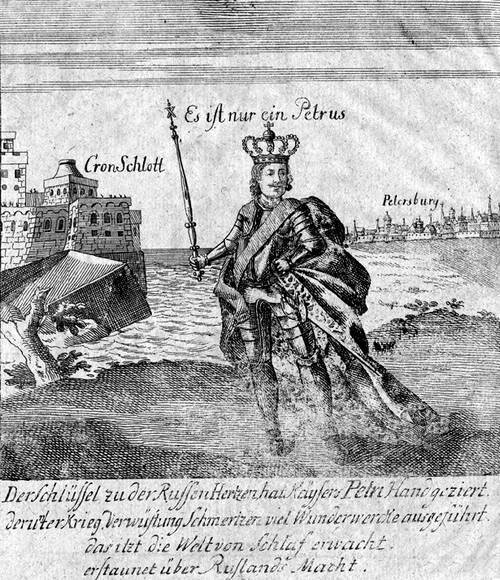
The Swedes claimed that they managed to repel two of the three attacks. But there is evidence that all 10 of their ships were captured during the first attack: it took the Swedes to talk about stubborn resistance in order to at least somehow justify their defeat.
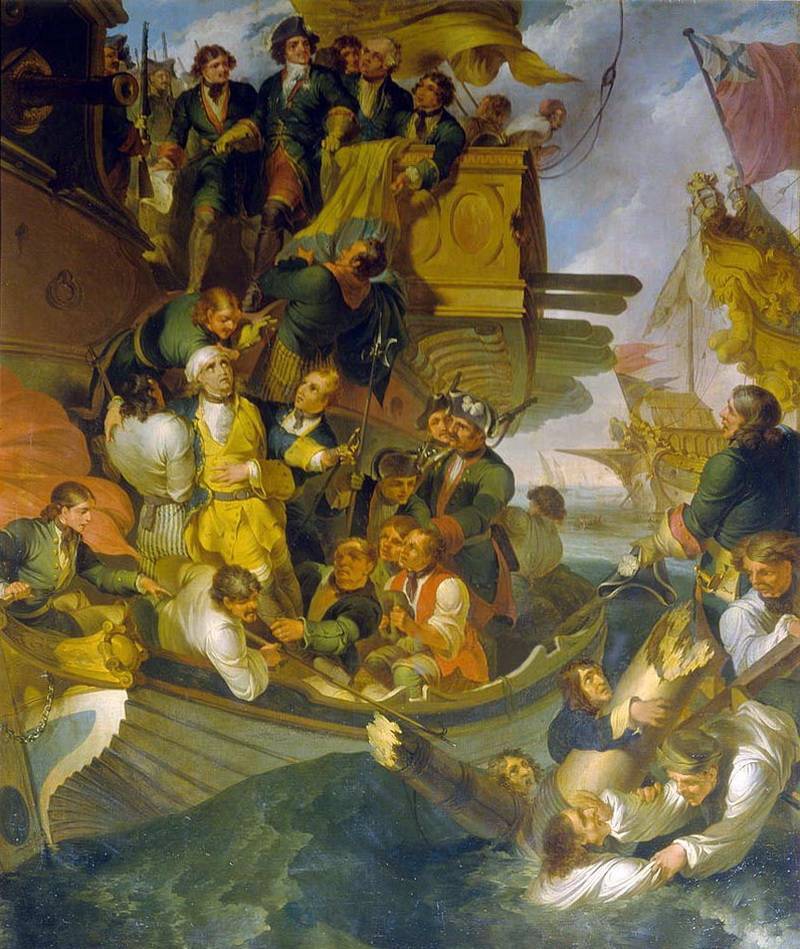
Robert Ker Porter. The capture of the Swedish Rear Admiral Erensheld in the Battle of Gangut in 1714
The Russians lost 127 people in this battle (8 of them officers), 342 soldiers and officers were wounded, 232 soldiers and 7 officers were captured (they were in the gallery that ran aground).
Swedish losses: 361 people were killed (including 9 officers) and 580 prisoners (of which 350 were injured).
After the defeat of Erenschild, Admiral Wattrang did not dare to join the battle, and led his squadron to the coast of Sweden, informing the Senate that it can now only defend the capital.
"Return of the King"
In the autumn of the same year, Charles XII finally left the Ottoman Empire - to the great pleasure of the Sultan and everyone who managed to get to know this Swedish king at least a little. On November 1714, 21, Karl arrived at the Pomeranian fortress Stralsund, which belonged to Sweden.
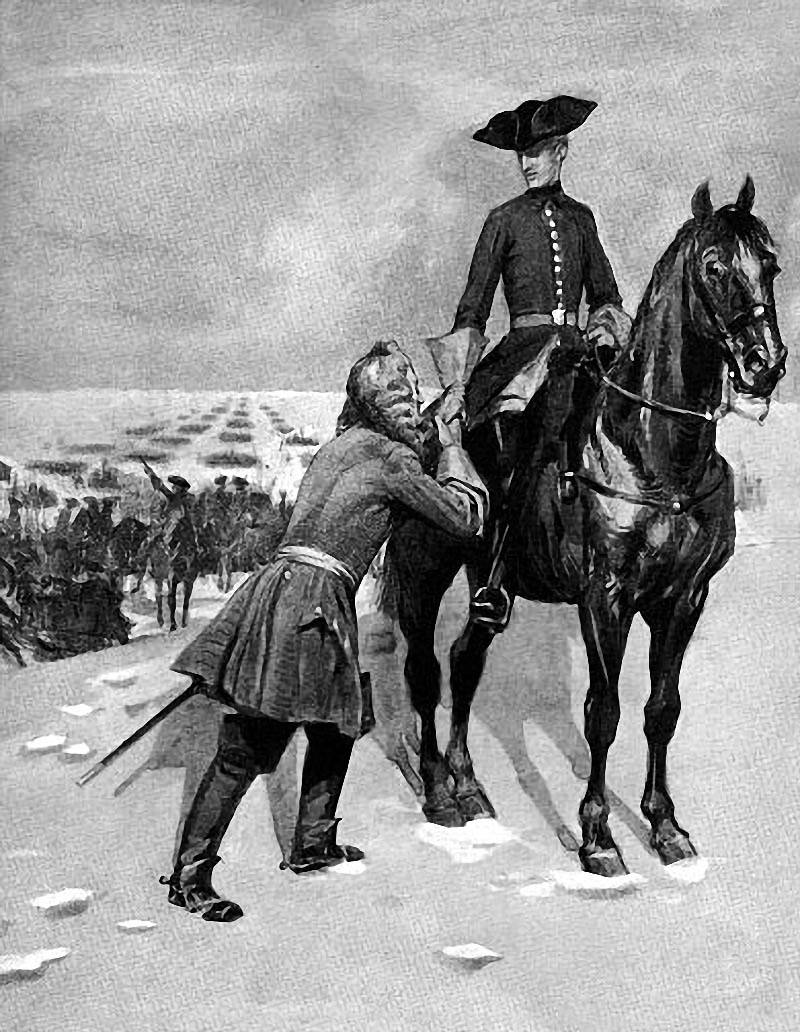
Albert Edelfelt. "Return of the King"
He ordered the start of a privateer war against all foreign (non-Swedish) merchant ships in the Baltic Sea, and send recruits to Pomerania. After receiving reinforcements, Charles XII attacked the receiving Stettin Prussia.
For another 4 years, he threw the best men of his kingdom into the furnace of war, to which desperate Swedes seemed to have no chance to end.
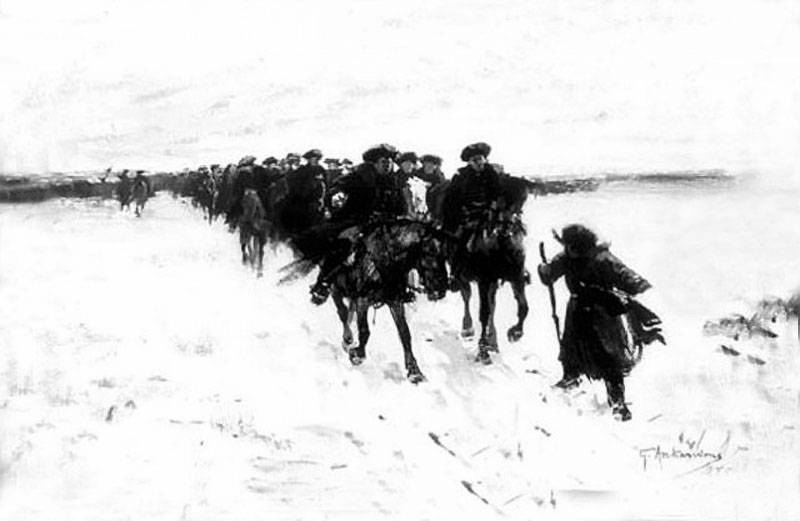
Gustav Ankarkron. Carolina
In July 1715, Danish-Prussian troops of 36 thousand people again besieged Stralsund, where Charles XII himself was. The nine thousandth garrison of the fortress fought against superior enemy forces until December 11, 1715. Two days before the fall of the fortress, Karl left Stralsund in a six-boat boat: he carried this boat across the sea for 12 hours until the Swedish brigantine met with her, on which he arrived at home.
On April 7, 1716, the last Pomeranian fortress of Sweden - Wismar capitulated. Karl at that time fought in Norway, which was then part of the Kingdom of Denmark.
Russian fleet in Copenhagen
Meanwhile, by June of this year, many Russian warships had gathered in Copenhagen: three ships built in Amsterdam (Portsmouth, Devonshire and Malburg), four Arkhangelsk ships (Uriel, Selafail, Varahael) and “Jagudiel”), a Sievers squadron of 13 ships (seven battleships, 3 frigates and 3 shnyavy) and Zmaevich’s galley. The planned landing on the coast of Scania did not take place, the Russians accused the Danes of wanting to conclude a separate peace treaty, and those of Peter I of trying to capture Copenhagen. It is difficult to say what actually happened, but the situation at some point became extremely serious. The garrison of the Danish capital was put on full alert, the king of Great Britain George I demanded the withdrawal of Russian troops from Germany and Denmark, ordering Norris, commander of the British squadron, to block the Russian fleet. But, realizing that such actions could lead to war, the admiral showed prudence: referring to some inaccuracies in the wording of the royal order, he did not begin to carry out it, asking for confirmation. Meanwhile, the royal ministers were able to convince the monarch that breaking off relations with Russia would be extremely disadvantageous for Britain, leading to the arrest of British merchants and the cessation of imports of strategically necessary goods. The military conflict between England and Russia was avoided. The Russian fleet left Copenhagen, the infantry units were assigned to Rostock and Mecklenburg, the cavalry to the Polish border. In Denmark, to symbolically signify an alliance with this kingdom, one cavalry regiment was left.
The death of Charles XII
On November 30, 1718, Charles XII was killed in Norway at the Fredriksten fortress.
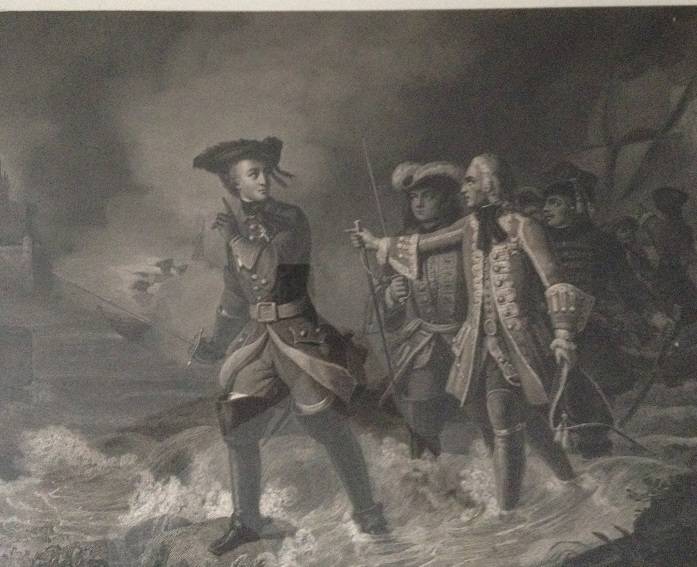
XNUMXth-century French engraving. King of Sweden Charles XII during the siege of the Fredriksten Fortress
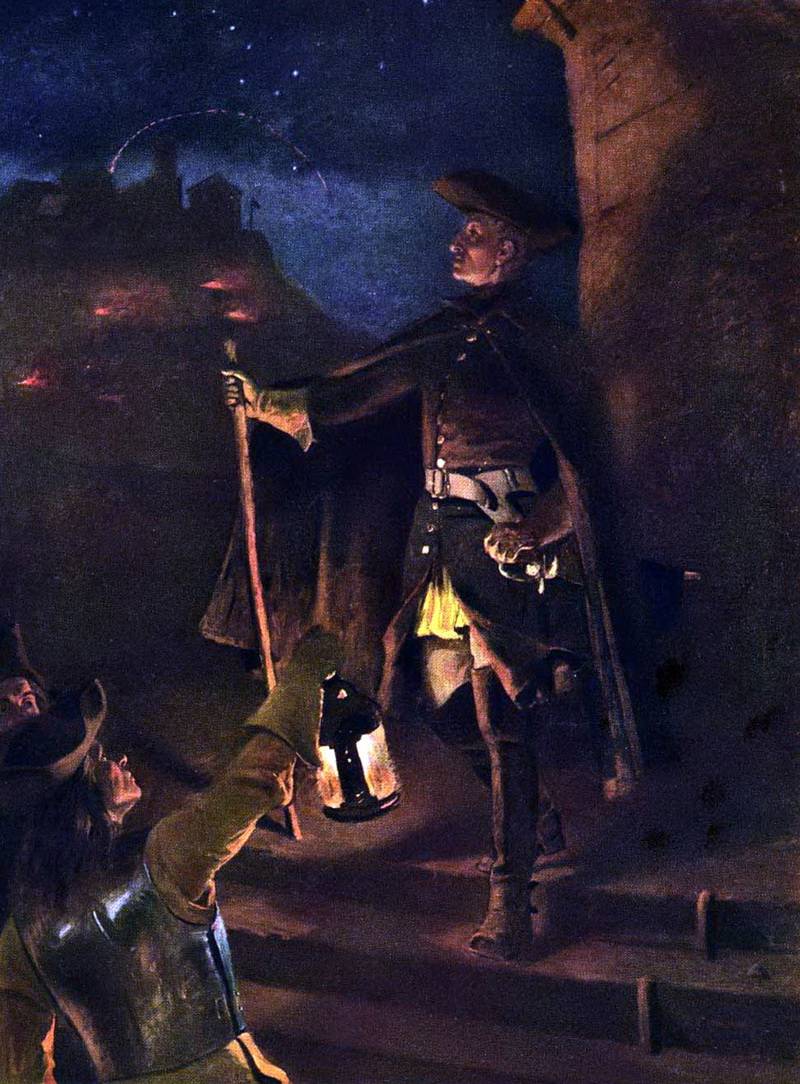 Carl Gustaf Cederström. “The Last Night of Charles XII at Fredrickshall”
Carl Gustaf Cederström. “The Last Night of Charles XII at Fredrickshall”The circumstances of his death are mysterious. Many historians believe that he was shot dead by one of his close associates, and not with a bullet, but with a button cut off from one of his uniforms and poured with lead: in Sweden it was believed that you could not kill this king with an ordinary bullet. This button was even found at the site of the death of Charles - in 1924. And its diameter coincided with the diameter of the bullet hole in the king’s hat, analysis of DNA traces found on the button and royal gloves showed the presence of a rare mutation in both samples, found only in Sweden.
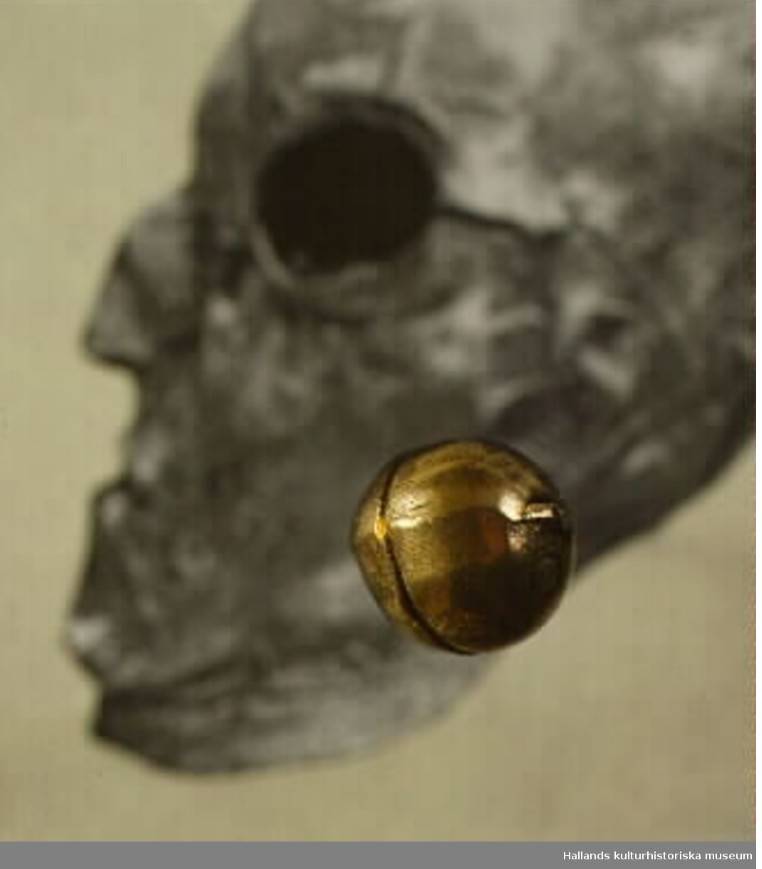
Button found by the blacksmith Karl Andersson
Nevertheless, the question of the death of Charles XII has not yet been finally resolved; historians of that period are divided into two groups holding opposing points of view.
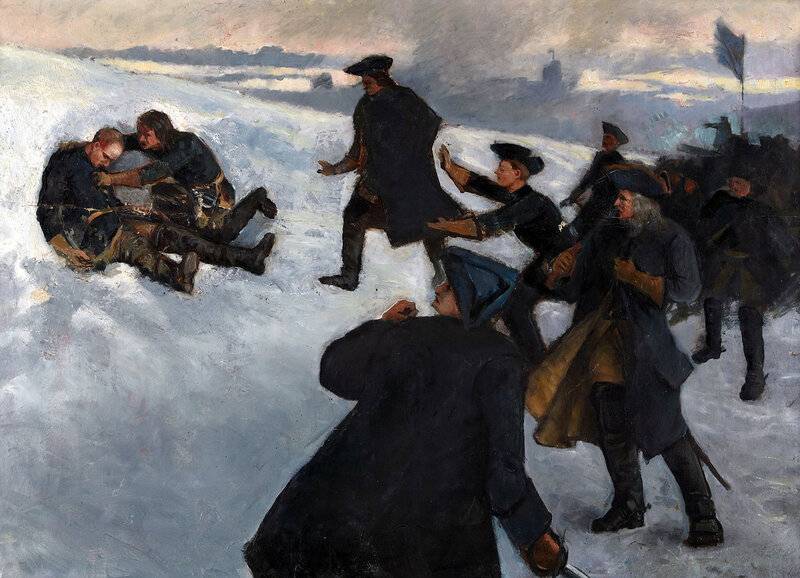
Carl Gustaf Cederström. The Death of Charles XII
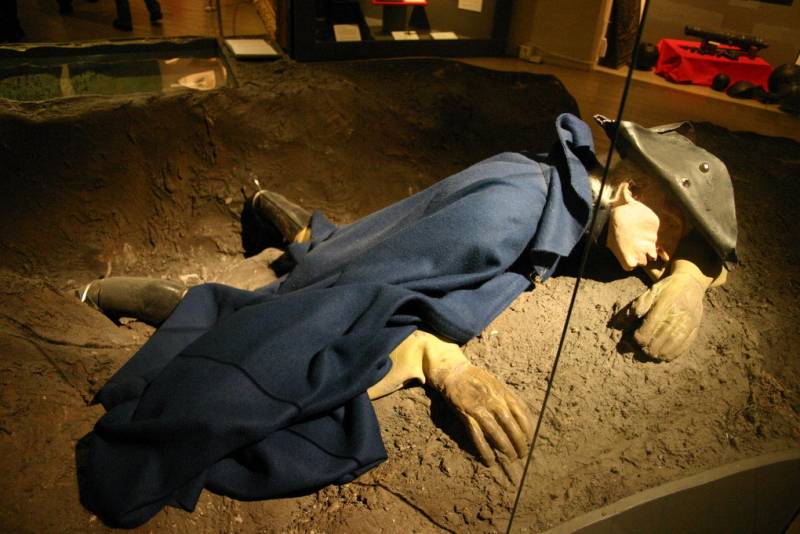
Reconstruction of the death of Charles XII on November 30, 1718 in the front trench at the besieged fortress
With the death of Charles XII, perhaps the main obstacle to the conclusion of peace was eliminated. Sweden now continued to fight, hoping only to bargain for itself more acceptable conditions of peace. It was necessary to convince the Senate, Queen Ulrika Eleanor and her husband, Frederick of Hesse (who would become king of Sweden in 1720), that both the indigenous territories of Sweden and Stockholm were now in danger and could be captured by Russian troops.
Ezel Island Battle
On May 24 (June 4), 1719, the Russian fleet won the first victory in the open sea and in artillery battle (without boarding battle) - it was a battle near the island of Ezel (Saarema).
Since 1715, Russian ships and squadrons began to capture Swedish merchant ships in the Baltic Sea. So in May 1717, the von Hooft detachment (three battleships, three frigates and one pink) “hunted” at sea, capturing 13 “prizes”. The captain of one of these ships reported another caravan, which was to be guarded by warships from Pillau (now Baltiysk, Kaliningrad Region) to Stockholm. Having received this news, Admiral-General F.M. Apraksin sent off the second combat detachment, which was led by captain of the 2nd rank N. Senyavin. It included six 52-gun battleships and an 18-gun schnavu.
Some of the Russian ships that took part in the Ezel battle:
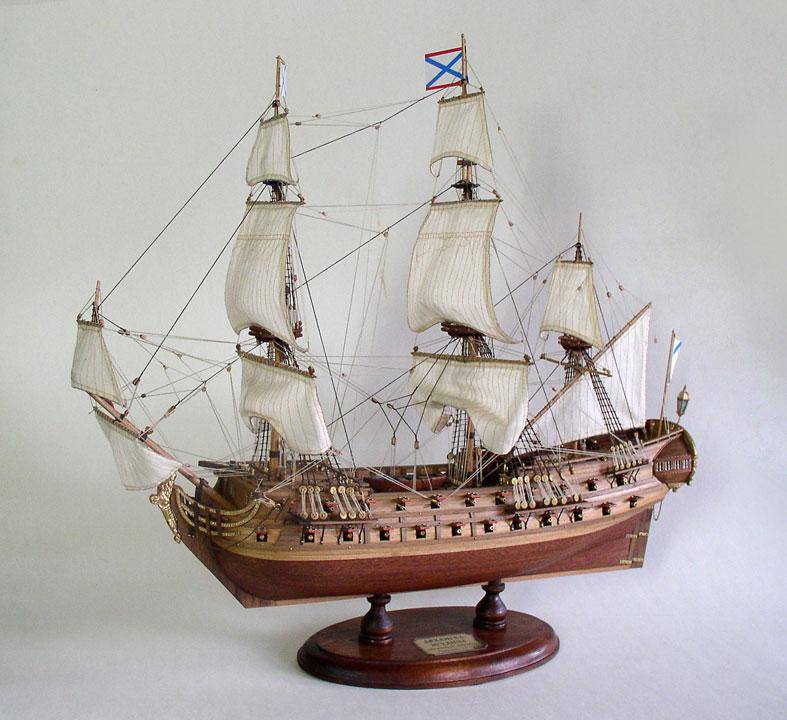
Layout of the battleship “Yagudiiel”: the first of the battleships of the Archangels series (Raphael, Uriel, Varahail and others). Laid down at the Solombala shipyard in the summer of 1713, commissioned - in 1715, length - 51,75 m., 52 guns
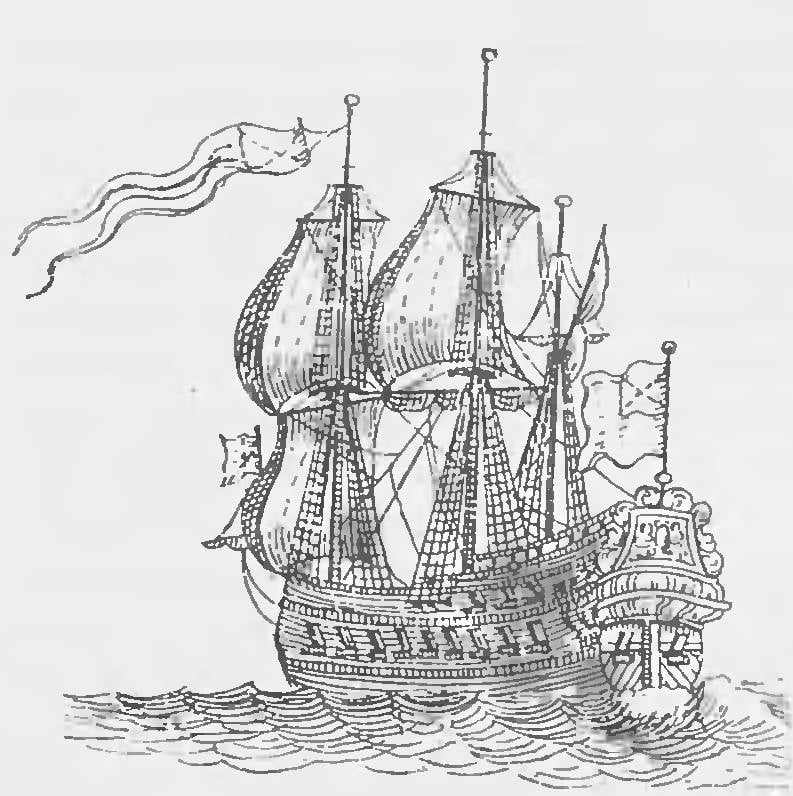
Shnyava "Natalia"
In the early morning hours of June 4, a Russian squadron discovered three Swedish warships off Ezel Island. These were the battleship Wachmeister, the frigate Karlskrona and the brigantine Bernard, under the command of Captain-Commander A. Wrangel. Assessing the situation, Wrangel tried to hide his squad in the skerries near the island of Sandgamna, but did not have time. The first ships to attack were the battleships Portsmouth (the flagship of the Russian squadron) and Devonshire. All three Swedish ships fired at Portsmouth — headquarters and Mars-Rae were killed on this ship. The forces were unequal, and the weaker Swedish ships (frigate and brigantine) lowered the flag even before the approach of other Russian ships - “Yagudiyila”, “Rafaila” and “Natalia”. The Wachmeister attempted to leave the battlefield and the Jagudiiel and Raphael chased after him, followed by Portsmouth later.
The Swedish flagship was overtaken at about 12 noon, after a three-hour battle, he was forced to surrender.
The losses of the parties were not comparable: the Swedes lost 50 people killed, 376 sailors, 11 officers and the captain-commander were captured. The Russians killed 3 officers and 6 sailors, 9 people were injured.
“Beat the enemy on its territory”
And in July of that year, the Russian landing units were first landed on the coast of Sweden.
The troops of F.M. Apraksin burned iron and copper plants on the island of Ute, captured the cities of Sørdetjell and Nyköping, and the city of Norrköping burned the Swedes themselves, flooding in its harbor 27 of their own merchant ships. On the island of Nekvarn, the cannon factory was captured by the Russians, 300 guns became trophies.
A detachment of P. Lassi, numbering about 3500 people, destroyed factories in the vicinity of the city of Gavle. The Swedish troops, who twice tried to enter the battle, did not achieve success, having lost three guns in the first skirmish, and seven in the second.
In August this year, landings were planted on both sides of the strategically important fairway Steksund. These units managed to get to the Vaxholm fortress protecting Stockholm, which caused panic among the population of the Swedish capital.
In total, as a result of this operation, 8 cities, 1363 villages were seized, 140 country houses and castles of Swedish aristocrats were burned, 21 plants, 21 mills and 26 military depots were destroyed.
England was then prevented from concluding peace by promising military assistance to Sweden and sending its squadron to the Baltic Sea in the spring of 1720 (18 battleships, 3 frigates, and other smaller vessels).
Grengam Island Naval Battle
This did not bother the Russians, and M. Golitsyn sent the brigadier Mangden to the Swedish coast with a six-thousandth landing force for 35 galleys. This detachment captured 2 cities and 41 villages. The combined Anglo-Swedish fleet came to the shores of Sweden, Mangden's troops returned to Finland, and the skerry squadron of M.M.Golitsyn (61 galleys and 29 boats) advanced to the Aland Islands. On July 27 (August 7), 1720, near the island of Grengam, which is part of the Aland Islands, the Russian fleet won another victory over the Swedes.
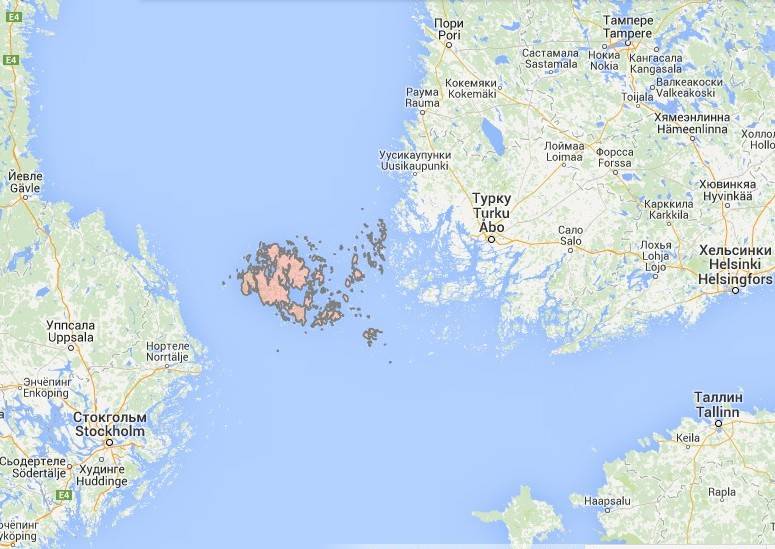
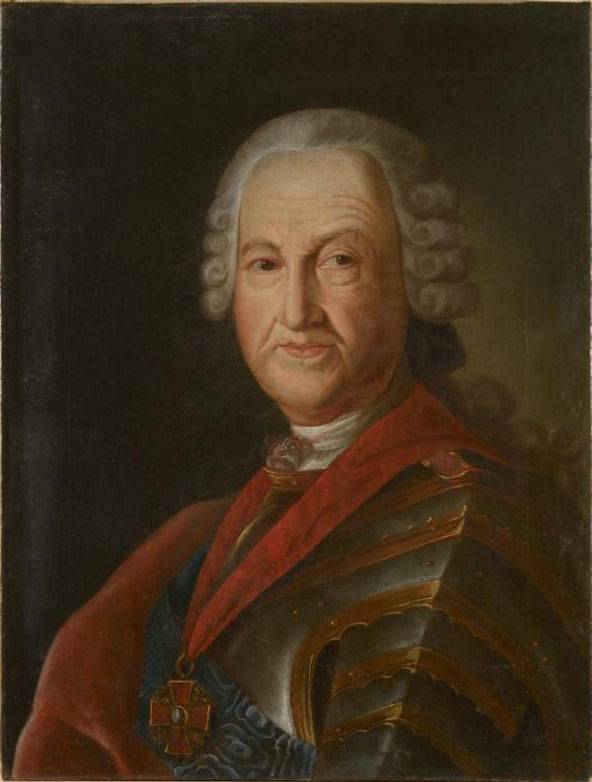
Golitsyn Mikhail Mikhailovich, the third in a row Admiral General of the Russian Navy, successor of A. Menshikov as president of the Admiralty College
The Swedish fleet, led by Karl Schöbald, consisted of a battleship, 4 frigates, 3 galleys, 3 skerboats, a shniva, a galliot and a brigantine with a total number of guns on board 156. The Swedish admiral was the first to attack the Russian galleys, which departed into a narrow and shallow strait between the islands of Grengam and Fleece. Here the advantage was already on their side: despite the strong artillery fire of the enemy, which disabled 42 galleys (many of them later declared unfit and burned), 4 frigates were captured and the battleship was almost boarded. Amazed British, making sure that their large sailing ships would be in great danger in the event of a battle against the skerry fleet of Russian galleys, did not even try to help their allies.
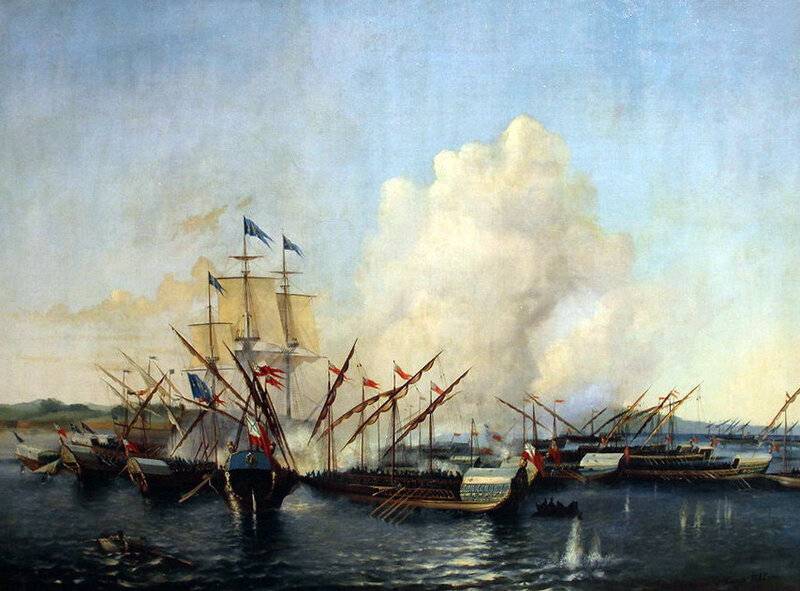
Ferdinand Perrault. “The Battle of the Grengam Island May 27, 1720”
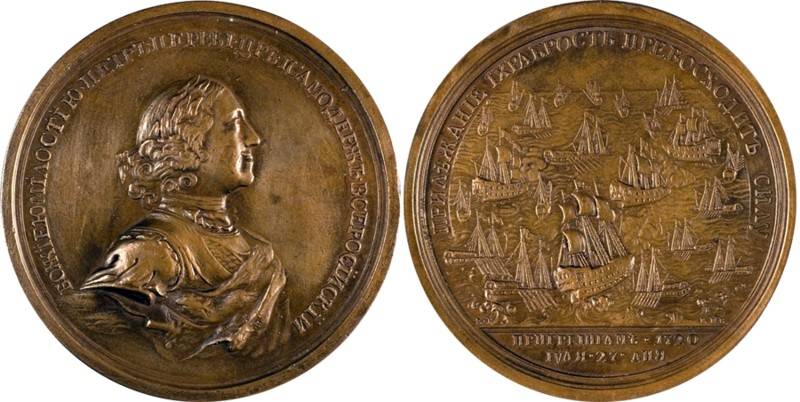
Medal commemorating the capture of four Swedish ships at Grengam on July 27, 1720. The inscription reads: “Diligence and courage exceed strength”
The battles at Gangut and Grengam took place in different years, but on the same day, on which the Orthodox Church commemorates the healer and holy great martyr Panteleimon. In honor of these victories in 1735, a church was laid in St. Petersburg, consecrated on July 27, 1739.
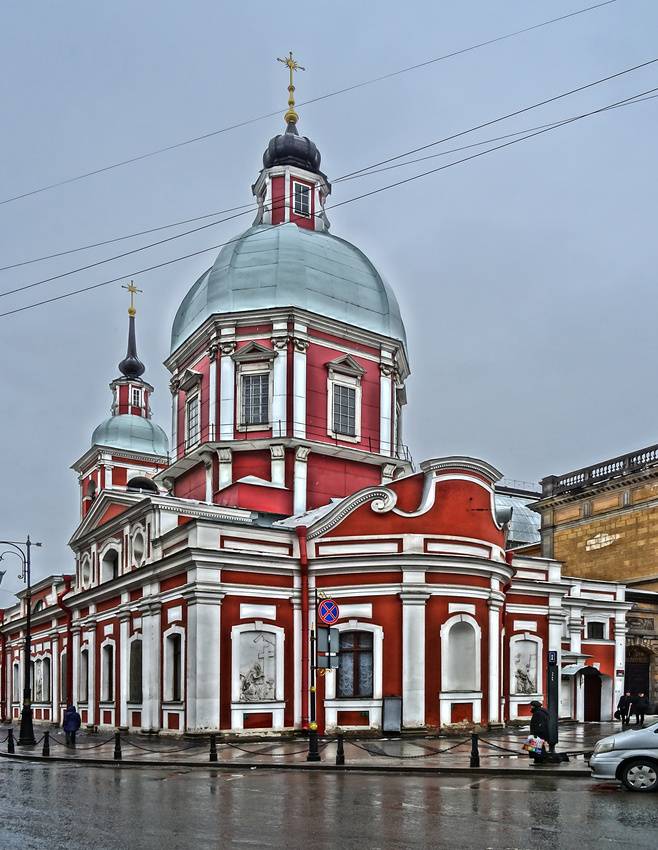
Panteleimon Church (Church of the Holy Great Martyr and Healer Panteleimon), St. Petersburg
Nistadt world
In May of the following year, Sweden was forced to enter into negotiations, which ended on August 30 (September 10), 1721 with the signing of a peace treaty in Nishtadt (now Uusikaupunki, Finland) that secured the Russian conquests in the Baltic states. The Swedes “sold” Russia to Ingria, Karelia, Estonia and Livonia for 2 million thalers - a huge amount, but it was precisely so many Saxon gold thalers that were captured from the Swedes after the Battle of Poltava, and about 700 thousand from Perevolnaya.
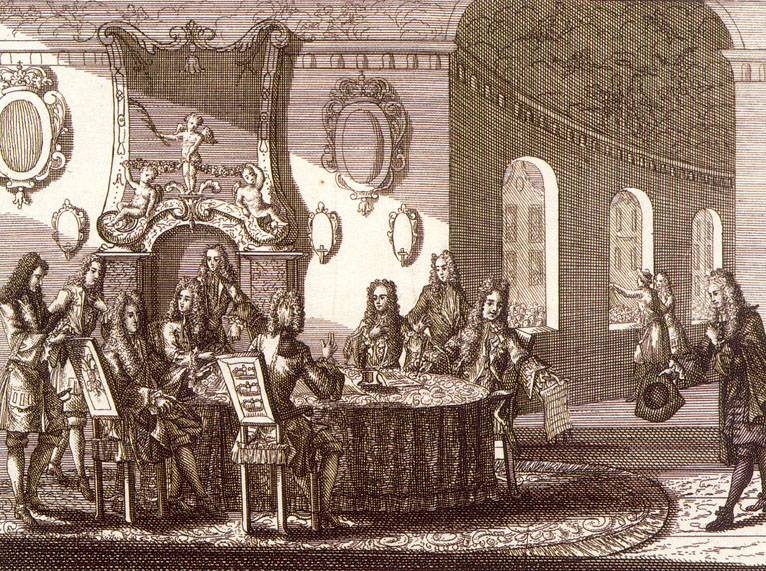
Peter Schenk. The signing of the peace treaty in Nishtadt on August 20, 1721
During the celebration of the Nishtadt Peace in St. Petersburg, Peter I remained true to himself, making part of the holiday a jesterly wedding of the new prince, Pope Buturlin, with the widow of his predecessor, Nikita Zotov.
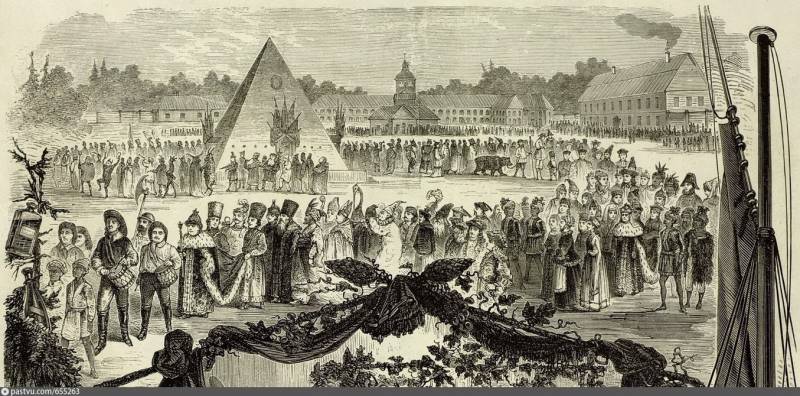
N.I.Sokolov. The wedding ceremony of the Prince-Pope and a masquerade in St. Petersburg, on the occasion of the Nishtadt Peace, September 10, 1721. From the album dedicated to the 200th anniversary of Peter I
But, although this holiday was of a somewhat frivolous and parody character, the victory itself was real.
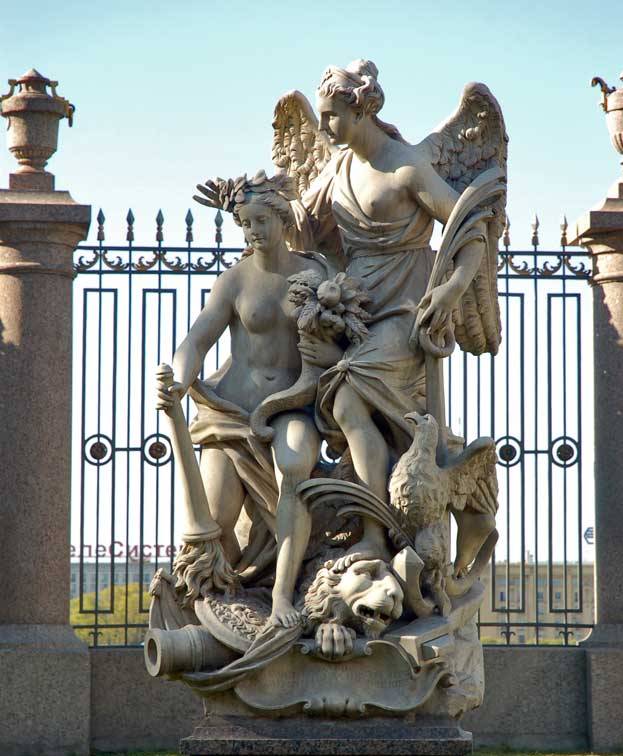
The sculptural group "Peace and Victory" (Summer Garden, St. Petersburg) - the personification of the victory of Russia in the Northern War and the Nishtadt Peace
At the end of the Northern War, the Swedish authorities refused Russian prisoners of war assistance in returning home. But the Russian government incurred the cost of transporting prisoners who were brought from all over the country to St. Petersburg and Kronstadt, from where they were sent by sea to Stockholm.
Charles XII and Peter I: opinions of descendants
At present, both in Sweden and in Russia they treat monarchs very differently, under whose leadership these countries waged a long and bloody war, the Northern War. There is no consensus either here or there.
In Sweden, on the one hand, they do not deny the catastrophic defeat and ruin of the state under Charles XII. The Swedish historian Peter Englund admits:
In addition to the loss of the eastern Baltic, Sweden was forced to cede part of its lands to Prussia and Hanover, and Denmark received Schleswig (because of the desire to own which she entered the war).
But even this defeat, some in Sweden almost credited the “warrior king”, saying that it became the reason for the rejection of the great-power policy and the cutback in the power of the monarchs, while the parliament was strengthened. Although they should thank the opponents of this king for this.
Local nationalists, as before, consider Charles XII a hero who glorified Sweden, who was only trying to protect Europe from Russian aggression. Since the XNUMXth century, panscandinavists have been grieving over the failed attempt of Charles XII to create an alliance between the united Swedish-Norwegian kingdom and Denmark.
The famous Swedish poet E. Tegner called Charles XII "the greatest son of Sweden." Some historians of this country compared it to Charlemagne.
On the day of the death of Charles XII (November 30), Sweden celebrates the Day of Stuffed cabbage (“Koldulmens Dag”) - a dish created on the basis of a Turkish dolma recipe, which the Swedes met with this king after his flight from Poltava in Bendery.

Swedish cabbage rolls (koldulmar)
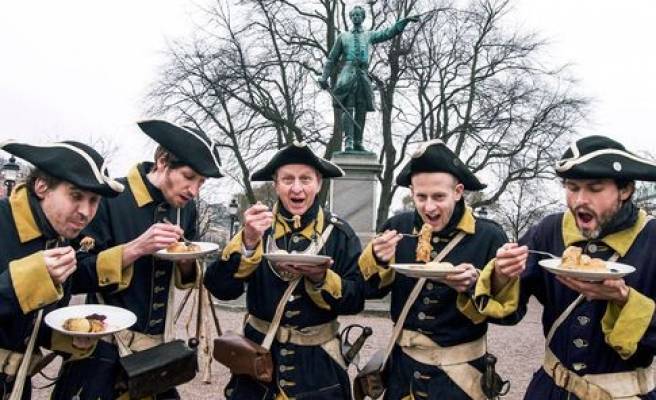
Sweden: Coldulmens Dag (Stuffed Dog Day) in Stockholm
And even the Swedish sobriety society on November 30 honors the memory of the king, who "drank only one water and despised wine."
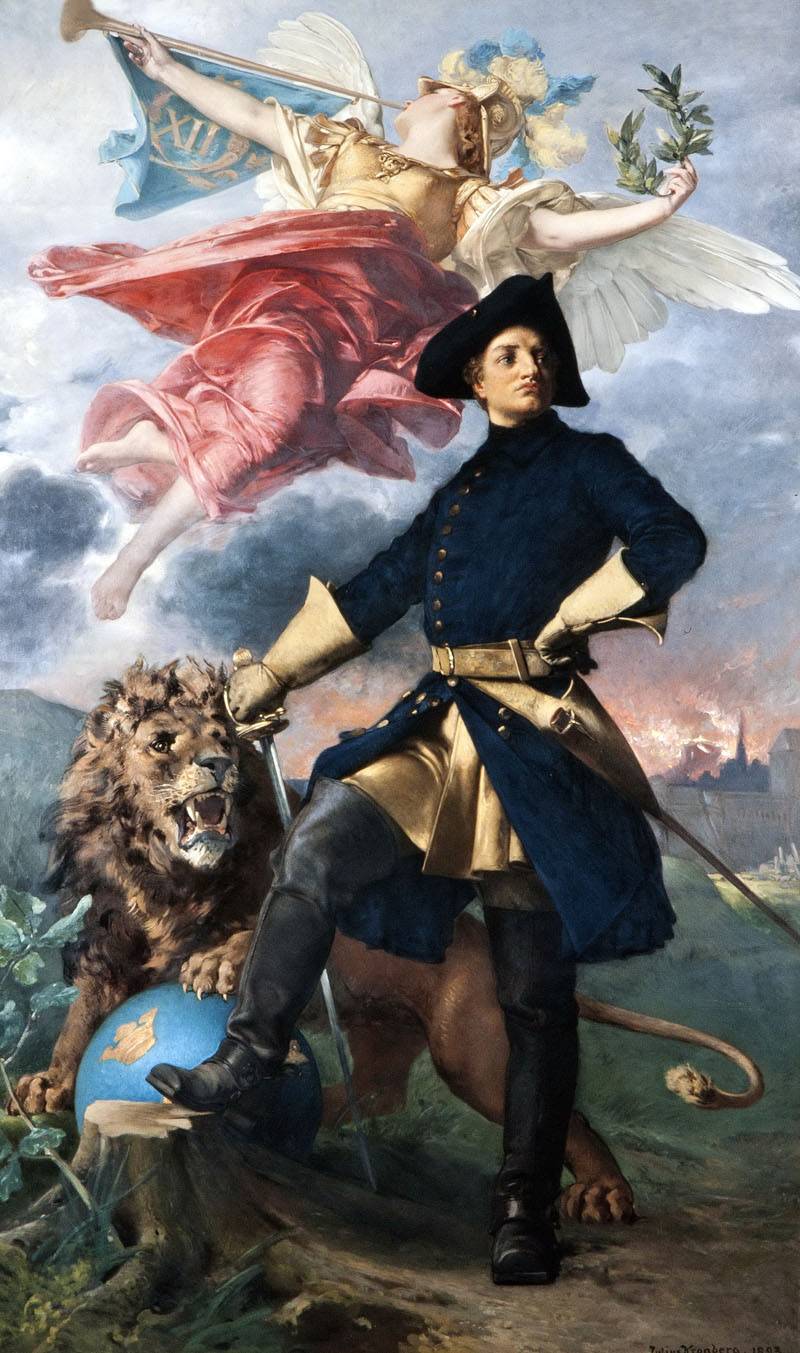
Julius Kronberg. Charles XII of Sweden, the picture was painted in 1893. When you look at this picture, you might think that the monarch depicted on it far pushed the boundaries of his state, and did not lose almost all the overseas possessions inherited from his predecessors
And it should be recognized that for all the controversy of such a position, it arouses a certain respect: the Swedes do not abandon their history, are not ashamed of it, do not spit on anyone and denigrate anyone. Such a reasonable approach to assessing our history is not a sin for us Russians to learn.
In Russia, in addition to the official point of view, there is an alternative, whose supporters believe that the reign of Peter I violated the natural course of Russian history and extremely critically evaluate the results of its activities.
M. Voloshin wrote about this in the poem “Russia”:
Intending to transfer Russia,
Inclusions and customs contrary to
For hundreds of years to its future distances.
He, like us, did not know other ways,
Sprinkle decree, execution and torture chamber,
To the realization of truth on earth.
And here are the lines Voloshin devoted to Petersburg:
Built on corpses, on bones
"All Russia" - in the darkness of the Finnish swamps,
With the spiers of churches and ships,
With the dungeons of the underwater casemates,
With standing water set in granite
With palaces of the color of flame and meat,
With the whitish hassle of nights
With the altar stone of Finnish black gods,
Trampled horse hooves
And with enlightened laurels and anger
Crazy face of copper Peter.
Emperor Alexander I, who knew well about the "noose that limits the Russian autocracy" (and even touched one of them with his chubby white fingers), said enviously:
A. S. Pushkin, who wrote the famous and textbook "Poltava", called Peter I both Robespierre and Napoleon, and spoke about his work in the archives:
L. Tolstoy called Peter I "a raging, drunk, rotten beast from syphilis."
V. Klyuchevsky said that “Peter I made history, but did not understand it,” and one of his most famous quotes is the following:
However, one cannot fail to admit that, as a result of the reign of Charles XII, Sweden turned into a secondary, little meaningful state at the back of Europe, and the barbarian kingdom of Muscovy during the time of Peter I was transformed into the Russian Empire in front of amazed contemporaries, which even Gorbachev and Yeltsin could not completely destroy .
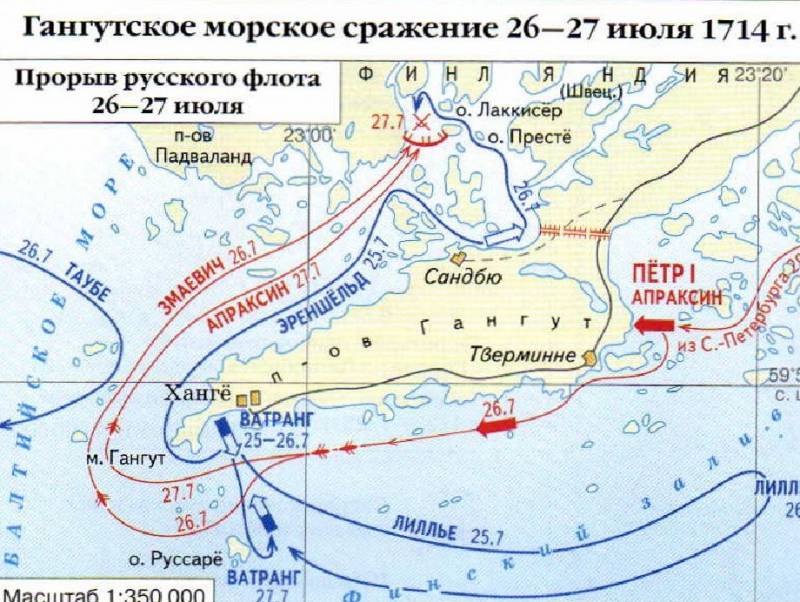
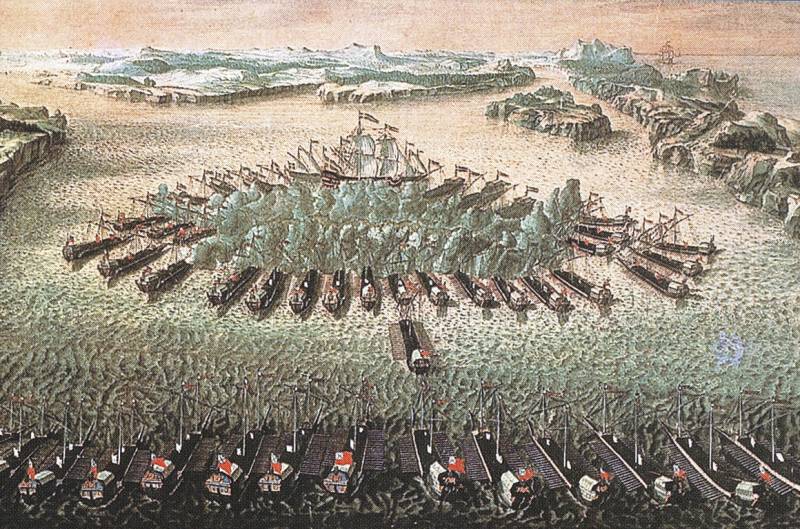
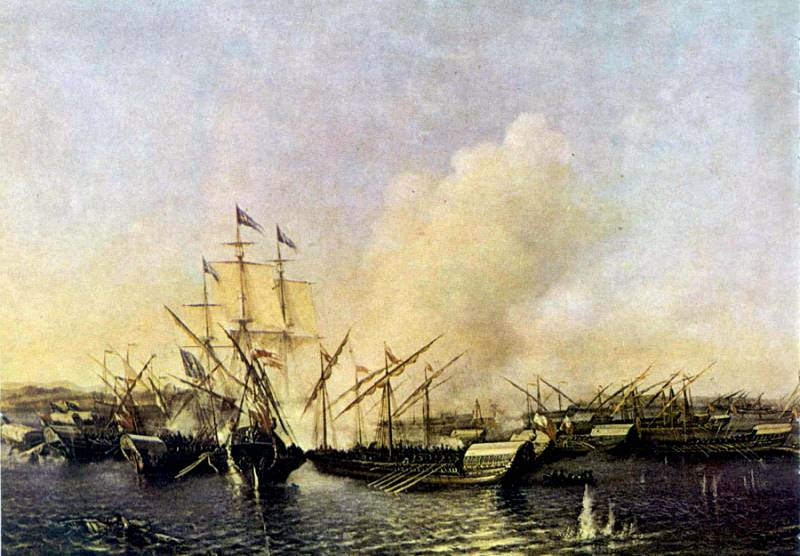
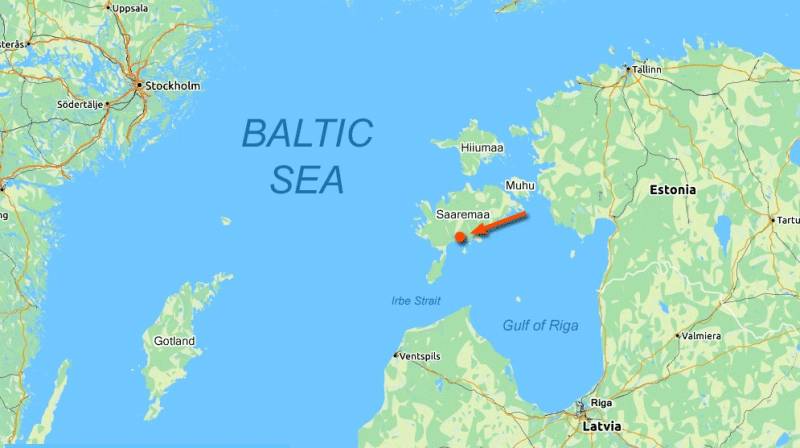
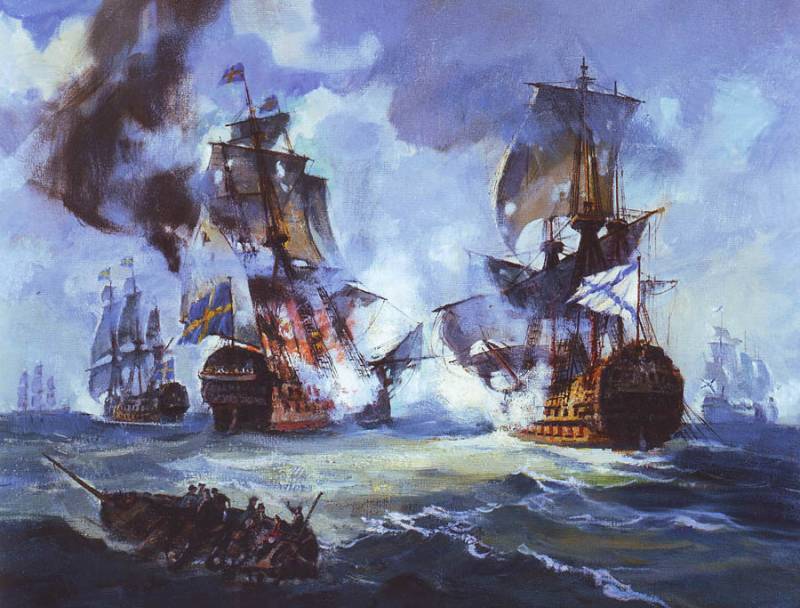
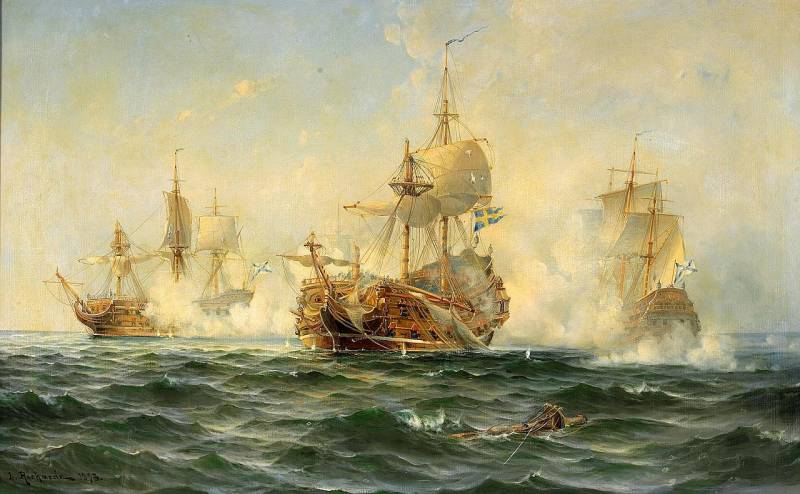
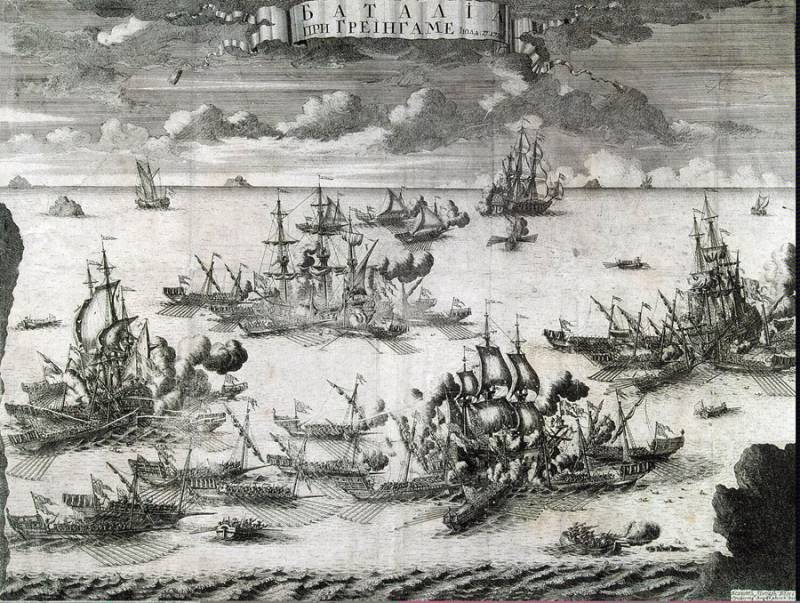
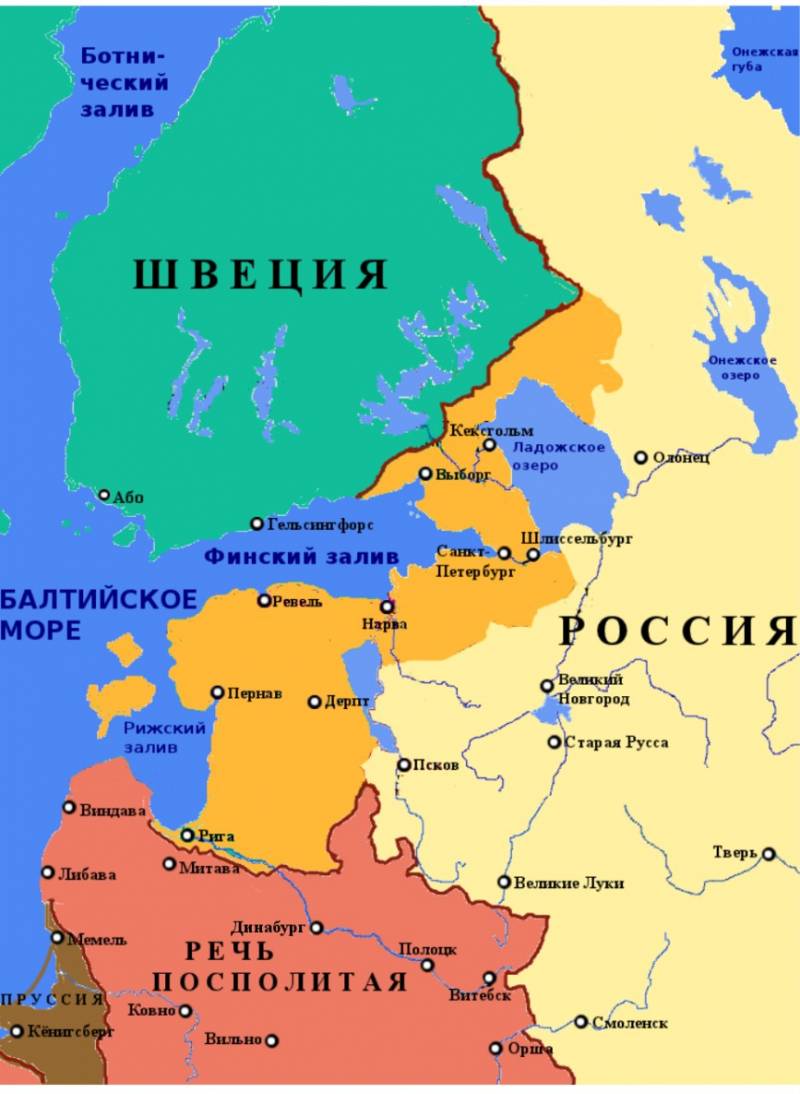
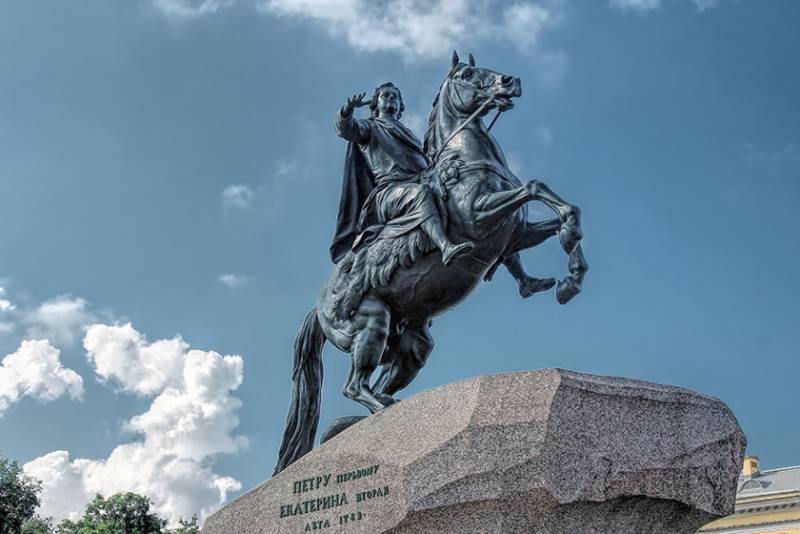
Information